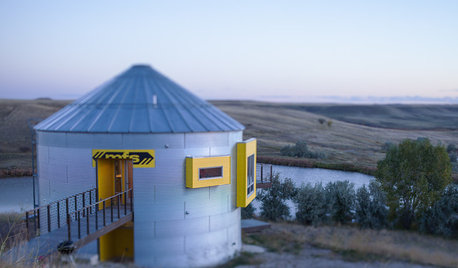Using grains as fertilizer
bpgreen
16 years ago
Related Stories

GARDENING GUIDESGet on a Composting Kick (Hello, Free Fertilizer!)
Quit shelling out for pricey substitutes that aren’t even as good. Here’s how to give your soil the best while lightening your trash load
Full Story
REMODELING GUIDESFinish Frenzy: End-Grain Wood
See More Ways Wood Can Go Beautifully Against the Grain
Full Story
HOUZZ TOURSMy Houzz: A Backyard Getaway Emerges From a Grain Shed
Cozy and brimming with country charm, this snug antiques-filled hideout encourages quiet pastimes
Full Story
COTTAGE STYLEBag a French Accent With Grain Sack
At home in country cottages to urban lofts, grain sack adds a French touch to pillows, upholstery, curtains and more
Full Story
MATERIALSFabric Focus: Decorate With Grain Sacks for Quick Farmhouse Style
Vintage and reproduction grain sack material creates thick, durable upholstery for sofas, chairs, pillows and more
Full Story
INDUSTRIAL STYLEHouzz Tour: Going Against the Grain in a Missouri Silo
See how a creative couple turned a metal grain bin into a most unusual container for living
Full Story
HOUZZ TOURSHouzz Tour: Prairie Grain Bin Turned Bucolic Retirement Home
An agrarian structure and a big dream combine in this one-of-a-kind home that celebrates 250 acres of Montana grasslands
Full Story
REMODELING GUIDESWhy Mahogany? Amazing Grain, Luminous Color
Mahogany's Character and Warmth Shines Indoors and Out
Full Story
VACATION HOMESHouzz Tour: A Mountain Retreat Goes Against the Grain
A woodsy ski lodge near Park City, Utah, lightens up its mood and color palette
Full Story
GARDENING GUIDESHow to Switch to an Organic Landscape Plan
Ditch the chemicals for a naturally beautiful lawn and garden, using living fertilizers and other nontoxic treatments
Full StorySponsored






soccer_dad
iowa50126
Related Professionals
Maple Valley Landscape Architects & Landscape Designers · Bridgetown Landscape Architects & Landscape Designers · Lakeland Landscape Contractors · Euclid Landscape Contractors · Ridgewood Landscape Contractors · South Lake Tahoe Landscape Contractors · Braintree Driveway Installation & Maintenance · Wildomar Driveway Installation & Maintenance · Lake Forest Driveway Installation & Maintenance · Weatherford Swimming Pool Builders · Candler-McAfee Fence Contractors · Berkeley Fence Contractors · Bethesda Fence Contractors · Bixby Fence Contractors · Peoria Fence Contractorsgrayentropy
deerslayer
fescue_planter
garett
deerslayer
greatlakesmower
sandyzz
billhill
decklap
Bpinto